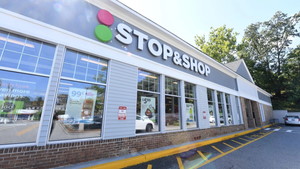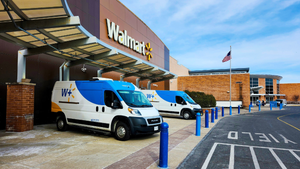- Grocery Wholesale & Distributors
- Legislation & Regulatory News
- Mergers & Acquisitions
- Grocery Operations
- Foodservice at Retail
C&S reportedly may buy stores from merger partners Kroger-AlbertsonsC&S reportedly may buy stores from merger partners Kroger-Albertsons
Talks are under way, and a nearly $2 billion deal for over 400 stores could emerge as soon as this week, according to published reports.

C&S Wholesale Grocers is in negotiations with The Kroger Co. and Albertsons Cos. to acquire stores that would need to be divested for regulatory approval of the $24.6 billion Kroger-Albertsons merger deal, published reports said.
Citing unnamed sources, Bloomberg reported Tuesday evening that Keene, New Hampshire-based C&S is in talks with Kroger-Albertsons to buy stores earmarked for divestiture and has enlisted investment firm Softbank Group Co. as a partner the transaction. Bloomberg’s report didn’t specify the number of stores to be sold but said that C&S may purchase all or most of the locations to be divested and a deal could emerge possibly this week.
C&S and Kroger couldn’t immediately be reached by Winsight Grocery Business for comment on Wednesday. Albertsons declined to comment.
According to Reuters, stores that could be divested by Kroger-Albertsons are in regions and markets where both supermarket companies operate, such as the Pacific Northwest, Southern California, Phoenix and Chicago. And in an updated report Wednesday afternoon, the news service said a deal with C&S could include 400-plus stores for almost $2 billion, based on information from anonymous sources. Kroger is due to report second-quarter results on Friday.
Cincinnati-based Kroger’s agreement to acquire Boise, Idaho-based Albertsons, unveiled in mid-October, would create a food and drug retailer with annual revenue of about $210 billion and 4,996 stores, 66 distribution centers, 52 manufacturing plants, 3,972 pharmacies, 2,015 fuel centers and 710,000 workers in 48 states and the District of Columbia. The deal, combining the two largest U.S. supermarket retailers, would mark the nation’s biggest-ever supermarket merger.
Kroger and Albertsons have estimated they would need to divest 100 to 375 stores to gain regulatory clearance for the merger. Their agreement also includes a ceiling of 650 store divestitures, at which point they could reassess the transaction, currently expected to close in early 2024. Stores would be divested through direct sales to other operators and/or via a new spinoff company called SpinCo.
In a late August interview with Winsight Grocery Business, Kroger Chairman and CEO Rodney McMullen said there have been plenty of potential suitors for divested stores. He also noted that Kroger and Albertsons are seeking proven, financially sound operators with unionized workers.
“Overall, we’ve been really pleased with the number of people that are interested in the stores. Obviously, you’re looking for somebody that’s going to be a very, very good operator of the stores,” McMullen told WGB. “Somebody that commits to keeping the stores open and to being a union operator, and somebody that has a lot of experience in the industry. Everybody that we’re talking to would satisfy all those things, and then a company would need to be well-capitalized so they have financial strength.”
The nation’s largest private grocery distributor, C&S Wholesale Grocers supplies more than 7,500 independent supermarkets, chain stores, military bases and institutions, offering over 100,000 products.
CFRA Research analyst Arun Sundaram noted that a possible $2 billion acquisition of over 400 stores by C&S would be larger than Kroger and Albertsons' preliminary projection for store divestitures.
"This number is higher than the initial estimate of 100 to 375 stores, but below the ceiling of 650 stores. The good news is that C&S Wholesale Grocers has the capital and experience to successfully operate these stores, including wholesale and distribution," Sundaram said in a research note on Wednesday. "That said, additional buyers may be required to fully satisfy regulatory authorities. Furthermore, while store divestitures would help alleviate market concentration concerns, regulators could potentially challenge the merger on the grounds of price discrimination and/or labor monopsony concerns. All in all, while this development increases the likelihood of the deal closing, we continue to believe the FTC will challenge the merger, which would then lead to court/litigation."
Still, C&S has made its retail ambitions known as its undergoes a leadership transition. In early August, C&S announced that Chief Operating Officer Eric Winn will succeed the retiring Bob Palmer as CEO effective Oct. 2. Before being named COO in late 2021, Winn served as president of commercial. In that role, he led the commercial organization in support of independent and chain customers and oversaw C&S’ expansion in the retail market. That included a November 2021 deal to acquire 12 Tops Friendly Markets supermarkets in New York and Vermont and convert them to Grand Union grocery stores. One of the upstate New York locations became a Piggly Wiggly supermarket.
In July 2021, C&S unveiled an agreement to acquire Sheboygan, Wisconsin-based Piggly Wiggly Midwest, which added 11 Piggly Wiggly corporate-run stores. Currently, C&S licenses the Piggly Wiggly banner to about 530 independently owned and operated supermarkets in 17 states through its Piggly Wiggly LLC subsidiary. And the day after announcing the Piggly Wiggly Midwest deal, C&S said that it was hiring former Stop & Shop president Mark McGowan as senior vice president of retail, a newly created position. At the time, Palmer said McGowan would lead the company’s growth into the retail and franchise space, which he described as “an active part of C&S’ growth strategy.”
The Reuters report noted that C&S lost one of its largest wholesale customers, East Coast supermarket giant Ahold Delhaize USA—owner of the Stop & Shop, Giant Food, Giant/Martin’s, Food Lion and Hannaford chains—when that company in late 2019 initiated a three-year supply chain transformation plan to switch to self-distribution, a transition that has nearly finished. That effort included the acquisition of three warehouses from C&S and new leases for a warehouse in Manchester, Connecticut, and a C&S facility in Bethlehem, Pennsylvania.
*Editor's Note: Article updated with more Reuters information on a potential C&S transaction and with analyst comment.
About the Author
You May Also Like






